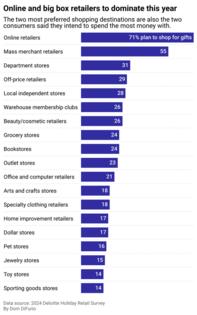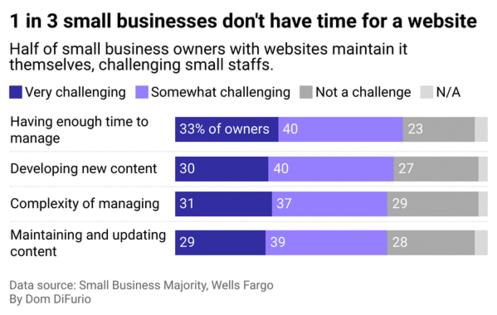On Small Business Saturday, establishments with a digital presence may have an edge
Published in Slideshow World
Subscribe
On Small Business Saturday, establishments with a digital presence may have an edge
The holiday shopping season can be the most wonderful time of year for consumers—but it's the most important time of year for small business owners. Yet many small business owners find themselves in a tight spot, as the growth of online shopping transforms major retailers into the go-to for shoppers seeking both convenience and good deals. While e-commerce platforms take precedence, many small businesses don't even have a website—and those that do may lack digital accessibility. This puts them at a disadvantage during the biggest shopping days of the year.
Holiday sales account for about a third, on average, of small businesses' annual revenue,according to Intuit's 2024 Holiday Shopping Report, with about 3 in 5 small business owners saying the holiday season is critical to the longevity of their business. When the holiday shopping season is short—2024 has five fewer shopping days—business owners have to make the most of promotions, both for brick-and-mortar and digital presences.
Business owners often use Small Business Saturday, which falls on the first Saturday after Thanksgiving, to gauge how well their stores will do during the holiday season. In 2023, consumersspent $17 billion on Small Business Saturday, a show of appreciation for the vitality that small businesses contribute to local economies. Deloitte found that 1 in 5 holiday shoppers plan to participate in Small Business Saturday in 2024, up from 14% in 2023.
However, while shoppers may want to support small businesses, they also want convenience and good deals. With increasingly high consumer expectations around an efficient shopping experience, nearly 2 in 5 shoppers plan to spend most of their holiday budgets at online retailers, and 1 in 5 plan to buy from big box stores where they can find multiple gifts in one place.
In a Wells Fargo and Small Business Majority survey, 3 in 10 small business owners said they didn't have a website for their business, even though the COVID-19 pandemic prompted many business owners to establish their digital presence. About 4 in 10 small businesses without a website still rely on social media to showcase themselves online.
Lacking a digital presence, small businesses are leaving much-needed revenue on the table. For those without a website, 2 in 3 businesses have less than $100,000 in revenue. For those with a website, less than half bring in under $100,000.
Analyzing survey data from Deloitte and fromWells Fargo and Small Business Majority, accessiBe illustrates the opportunities for small businesses to attract a broader range of customers by boosting their digital presence.
Visit thestacker.com for similar lists and stories.
2024 holiday shoppers prefer online shopping by wide margin
The COVID-19 pandemic forced many small businesses to add some sort of e-commerce platform to their business model or risk going out of business. While about 1 in 3 small businesses sell through their own website, many use existing sales platforms that may require less effort. These include third-party platforms like Etsy or Amazon, and community marketplaces like Craigslist and Facebook Marketplace.
However, some third-party platforms are more accessible than others.
A lack of keyboard navigation and descriptive alt text for product images—as well as limited or no color contras—are just a handful of factors that make websites challenging to access for some individuals. Ensuring that sites are operable without a mouse and making the search bar and cart landmarks on a page enhance e-commerce accessibility, as do captions on meaningful videos and clear directions.
Meeting consumers where they want to shop has expanded the ways small business owners capture sales. Over half of the Small Business Majority survey respondents reported they get at least 25%—and up to 75%—of annual sales from online channels.
While that boosts their profits, small business owners also note challenges with maintaining an online sales platform. The costs of doing e-business can eat into profits, with over 1 in 3 survey respondents reporting that third-party fees and shipping costs make e-commerce site management less affordable.
Small businesses struggle to manage sites
For a small business owner with few or no other employees, designing and running a website is one more thing on a long to-do list of everything that needs to be done to run a business, including managing inventory, accounting, operations, and human resources functions. And with over 1 in 3 survey respondents saying they simply don't know how to build one, this knowledge gap can lead to procrastination or uncertainty about leaning into the digital business.
As business owners build or improve their digital presence, accessibility should be an essential part of this development. It's essential tocomply with the Americans with Disabilities Act to ensure digital accessibility, but prioritizing accessibility puts businesses in a better position to profit. The right internal or external developer can take advantage of free open-source component libraries and implement theWeb Content Accessibility Guidelines to create better interfaces that address a variety of needs. Doing so can help businesses have more engaged employees and provide a better customer experience that leads to higher sales.
However, burying heads in the sand could work against business owners as shoppers continue to take their dollars to online platforms. Luckily, many small business advocacy groups like Small Business Majority,Goldman Sachs' 10,000 Small Businesses Program, and theNational Federation of Independent Business have resources for small businesses. The Small Business Digital Alliance has a freedigital tool library to help business owners better understand how to build a digital presence, find new customers, understand cybersecurity, and more.
Story editing by Alizah Salario. Additional editing by Kelly Glass. Copy editing by Tim Bruns.
This story originally appeared on accessiBe and was produced and distributed in partnership with Stacker Studio.









Comments